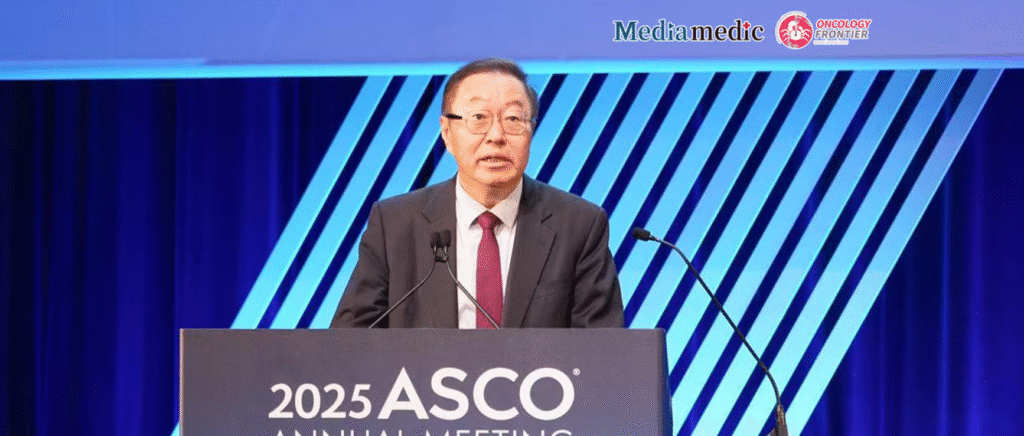
Editor’s Note: Sacituzumab tirumotecan, a novel TROP2-targeting antibody-drug conjugate (ADC) developed in China, has demonstrated promising therapeutic potential across multiple tumor types, including lung and breast cancer. At the 2025 ASCO Annual Meeting, a pivotal Phase II trial—OptiTROP-Lung03, led by Dr. Li Zhang of the Sun Yat-sen University Cancer Center—was selected for an oral presentation, marking a significant step for domestically developed TROP2-ADC therapy in tackling resistance in EGFR-mutant non-small cell lung cancer (NSCLC). With this presentation, Dr. Zhang brings Chinese innovation to the global oncology stage.Tracing ASCO: Precision Targeting Meets Broad-Spectrum Activity
Sacituzumab Tirumotecan: A New Weapon Against EGFR-Mutant NSCLC
Sacituzumab tirumotecan is a next-generation TROP2-targeted ADC independently developed in China. Recently, our team published a paper in Nature Medicine summarizing the efficacy data and biomarker analyses from two early-phase clinical trials involving this agent in NSCLC patients. The results clearly indicate that sacituzumab tirumotecan provides substantial clinical benefit in previously treated advanced NSCLC. Biomarker findings suggest that tumor cells harboring EGFR mutations demonstrate enhanced internalization and anti-tumor response to this agent. This supports the dual advantage of “precise enrichment” and “broad-spectrum coverage,” with efficacy observed across both EGFR-negative and -positive populations—particularly favoring those with EGFR mutations.
At ASCO 2025, we presented the results of the randomized Phase II OptiTROP-Lung03 trial, which evaluated the efficacy and safety of sacituzumab tirumotecan in EGFR-mutant NSCLC patients who had progressed following EGFR-TKI and platinum-based chemotherapy. The study demonstrated that, compared to docetaxel, sacituzumab tirumotecan significantly improved objective response rate (ORR), progression-free survival (PFS), and overall survival (OS) in this challenging patient population.
Key Findings: Robust Efficacy in a Refractory Population
According to blinded independent central review (BICR):
· ORR: 45.1% in the sacituzumab tirumotecan group vs. 15.6% in the docetaxel group → A 28.9% absolute improvement, achieving the study’s primary endpoint. → Notably, this benefit was consistent regardless of TROP2 expression level.
· PFS: Median 6.9 months vs. 2.8 months (HR: 0.30, 95% CI: 0.20–0.46; one-sided P < 0.0001) → A 4.1-month extension in median PFS with a 70% reduction in the risk of progression or death.
· OS: Median OS not reached in either arm at data cutoff. → However, the sacituzumab tirumotecan group showed a 51% lower risk of death vs. docetaxel (HR: 0.49, 95% CI: 0.27–0.88, one-sided P = 0.007). → Importantly, the trial allowed crossover from docetaxel to sacituzumab tirumotecan upon progression. Adjusted analysis showed a corrected HR of 0.36 (95% CI: 0.20–0.66), indicating a 64% reduction in mortality risk.
Safety Profile: Better Tolerability Without Interstitial Lung Disease
Sacituzumab tirumotecan also exhibited a favorable safety profile:
· Grade ≥3 TRAEs and serious TRAEs occurred at lower rates than in the docetaxel group.
· No interstitial lung disease (ILD) events were reported.
· No treatment discontinuations or deaths were attributed to TRAEs.
Based on this body of evidence, sacituzumab tirumotecan has proven significantly superior to docetaxel in previously treated EGFR-mutant advanced NSCLC. As a result, the drug was officially approved by the China National Medical Products Administration (NMPA) in March 2025 for the treatment of adults with locally advanced or metastatic EGFR-mutant NSCLC following progression on EGFR-TKI and platinum-based chemotherapy.
In addition, we are pleased to share that the full OptiTROP-Lung03 study manuscript has been accepted by The BMJ (Impact Factor: 93.69) and is expected to be published online within the coming week.
Looking Ahead: Shaping the Future of EGFR-Mutant NSCLC Treatment
In patients with advanced EGFR-mutant NSCLC who have progressed after EGFR-TKIs and platinum-based chemotherapy, sacituzumab tirumotecan offers breakthrough clinical benefits, redefining post-resistance treatment strategies. With marked improvements in ORR, PFS, and OS, and a manageable safety profile, this novel ADC stands out as a promising standard-of-care option. As a major step forward in precision oncology, it has the potential to transform clinical practice and provide renewed hope for a population long in need of better solutions.
References [1] Li Zhang, et al. Sacituzumab tirumotecan (sac-TMT) in patients (pts) with previously treated advanced EGFR-mutated non-small cell lung cancer (NSCLC): Results from the randomized OptiTROP-Lung03 study. ASCO 2025, abstract 8507. [2] Zhao S, Cheng Y, Wang Q, et al. Sacituzumab tirumotecan in advanced non-small-cell lung cancer with or without EGFR mutations: phase 1/2 and phase 2 trials. Nat Med. Published online April 10, 2025. doi:10.1038/s41591-025-03638-2

About Dr. Li Zhang
· Director of Internal Medicine, Chief Lung Cancer Expert, Sun Yat-sen University Cancer Center
· PhD Supervisor and Second-Rank Professor
Key Roles and Affiliations:
· Chair, Committee on Cancer Rehabilitation and Palliative Care, Chinese Anti-Cancer Association (CACA)
· Incoming Chair, Committee on Clinical Research of Anticancer Drugs, CACA
· Chair, Expert Committee on Immunotherapy, Chinese Society of Clinical Oncology (CSCO)
· Vice Chair, NSCLC Expert Committee, CSCO
· Vice Chair, Committee on Supportive and Rehabilitative Care, CSCO
· Chair, Clinical Research Branch, Guangdong Medical Association
· Chair, Precision Medicine Branch, Guangdong Clinical Medical Association


